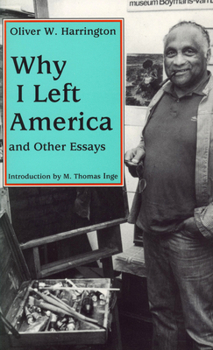Why I Left America and Other Essays
Select Format
Select Condition 
Book Overview
An African-American artist, self-exiled behind the Iron Curtain, gives his unique perspective on his homeland and on the culture that produced him This description may be from another edition of this product.
Format:Paperback
Language:English
ISBN:1604738987
ISBN13:9781604738988
Release Date:July 2010
Publisher:University Press of Mississippi
Length:144 Pages
Weight:0.35 lbs.
Dimensions:0.3" x 5.0" x 8.0"
Customer Reviews
1 rating
Why I Left America and Other Essays
Published by Thriftbooks.com User , 23 years ago
Exile As FoundOllie Harrington's life and career intersected with notable as well as infamous African-Americans of his generation, among them Langston Hughes, Paul Robeson, Richard Wright, Walter White, Adam Clayton Powell, Beauford Delaney, Howard Cousins, Chester Himes, and James Baldwin. Variously described as a raconteur par excellence, acerbic critic of U.S. domestic and international policy, a man gifted with extraordinary wit, insight, and the genius with which to represent them through his art, Harrington's own life and career has yet to be adequately explored and interpreted. M. Thomas Inge's compilation of nine of Harrington's essays is a cautious step in that direction. Published one year after "Dark Laughter: The Satiric Art of Oliver W. Harrington," Inge as editor of both volumes fails to fully flesh out the complex man behind both art and words. Fortunately, this is of little consequence. Harrington's essays speak eloquently enough for themselves. Additionally, both the first of these essays, "The Last Days of Richard Wright," as well as the profound friendship Harrington and Richard Wright shared are sensitively contextualized and elucidated in a perceptive "Introduction" by Julia Wright, Richard Wright's eldest daughter. Harrington's controversial essay, first published in Ebony magazine in 1961, continues to raise questions surrounding the peculiar circumstances of Richard Wright's death. Through it, we are brought into the frighteningly dangerous, alienated, oftentimes paranoid world of the expatriate-- a world further problematized by the politics of race, both American and international, and the personal and professional rivalries within the Parisian Black expatriate community that continuously threatened its fragile makeup. Overall, Harrington's essays are mimetic, faithfully, yet ironically recording a world both treacherous and absurd; where perfidy poignantly gives way to satire and laughter; where ultimately, one is left to muse what it means to be "Black," as well as an "American" without a country-- in fact, an exile, twice over. One senses that Harrington's narration and dramatization of the verisimilitudes of historical events, from topical pieces such as the birth of his best-known character, "Brother Bootsie," ruminations on his career in the U.S. and Europe, to personal reflections on his relationships with luminaries Richard Wright, Langston Hughes, and Paul Robeson, come from a deep sense of moral outrage over how much the United States lost and continues to loose given what W.E.B. du Bois defined as the central problem of the twentieth century. It is high time that Harrington, a major political wit and witness of the last century receives the attention that eluded him during his own lifetime.





